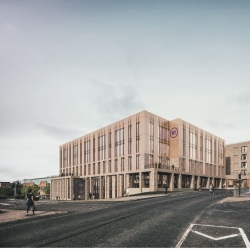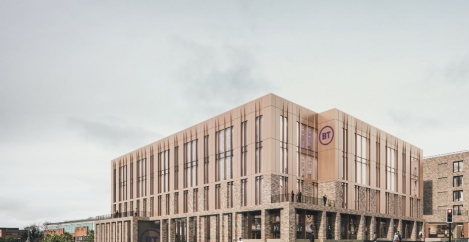August 2, 2021
Corporate real estate markets continue to improve worldwide, report claims
 There has been a further improvement in sentiment across the global corporate real estate market, according to the latest RICS Global Commercial Property Monitor. Respondents highlight a continued steady recovery, with the Americas and Europe leading the way. Importantly the improvement is being recorded on both the occupier and the investor sides of the market, reflecting improved macro-economic factors. Sentiment amongst both occupiers and investors continues to recover, consistent with the expectation of a sustained economic recovery from the pandemic. The global sentiment reading for occupiers rose from -26% to -10%, whilst for investors it climbed from -10% to +1%. However, whilst forecasts for the global economy have strengthened, uncertainty remains over any future impacts of COVID following the upsurge in cases linked to Delta variant.
There has been a further improvement in sentiment across the global corporate real estate market, according to the latest RICS Global Commercial Property Monitor. Respondents highlight a continued steady recovery, with the Americas and Europe leading the way. Importantly the improvement is being recorded on both the occupier and the investor sides of the market, reflecting improved macro-economic factors. Sentiment amongst both occupiers and investors continues to recover, consistent with the expectation of a sustained economic recovery from the pandemic. The global sentiment reading for occupiers rose from -26% to -10%, whilst for investors it climbed from -10% to +1%. However, whilst forecasts for the global economy have strengthened, uncertainty remains over any future impacts of COVID following the upsurge in cases linked to Delta variant.
The RICS global indicator, which tracks the sentiment of on both the occupier and investment side of the corporate real estate market, has risen for the fourth consecutive quarter, and whilst still negative, stands at -4%, its best level since Q4 2019 (+3%).
Rising tenant demand for industrial and logistics property is contributing to this being the strongest performing sector, continuing the trend from previous quarters with the aggregated net balance rising from +19% to +30%. This has been particularly driven by the Americas and Europe, with the industrial tenant demand indicator hitting an all-time high in the United States. Industrials/logistics are also predicted to deliver the strongest capital value gains, alongside data centres and followed closely by the multifamily sector.
A slight shifting of sector trends can also be seen in retail, where although still heavily negative, the global metric for tenant demand has moved from -50% to -27%, showing the rate of decline in the sector is slowing. That said, in Europe, rents for retail are expected to remain under pressure with prime rents envisaged to fall by -3% in the year to come, while a hefty -8% decline is projected for secondary retail rents.
Meanwhile, tenant demand for office space is now showing tentative signs of stabilising with the negative reading improving from -41% to -16%. In Europe prime office rental expectations are showing resilience and have moved into marginally positive territory for the first time since the end of 2019, with 1% growth anticipated. However, there is a -3% fall expected for secondary office rents, indicating the importance of defining the function and location of offices in the future. The tenant demand for offices and retail are contrasted in APAC, where the results in Q1 were not as negative as elsewhere but the improvement in Q2 has been much more modest, edging up from -24% to -21% for offices and from -36% to -35% for retail.
Reinforcing the more positive mood from respondents is that they now view global corporate real estate as edging away from the downturn phase of the cycle, representing another small but a positive turning point. 46% of respondents perceive the market in an upturn phase compared to 36% in the past quarter, whilst only 40% suggest the market is in a downturn phase or at the bottom of the cycle, compared to 50% previously.
Other key findings from our latest results include:
- Results are mirrored across the majority of the globe, but Europe and the Americas is leading slightly, with APAC slightly behind, whilst the Middle East and Africa is lagging a little further behind due to pre-COVID challenges due to an overhang of supply.
- Earlier in the pandemic, APAC was seemingly recovering quicker than other parts of the world. However, it should be noted that the responses for this set of results were taken in June when lockdowns in parts of APAC may have had an impact on the feedback.
- Concerns on valuation of real estate remain, with just under half of respondents viewing commercial property as being expensive or very expensive.
- Significantly, global capital value expectations have shifted noticeable for hotels, suggesting they are on the edge of recovery as the global economy reopens. In Q1 a -5% drop was expected but respondents are now taking a more neutral position.















